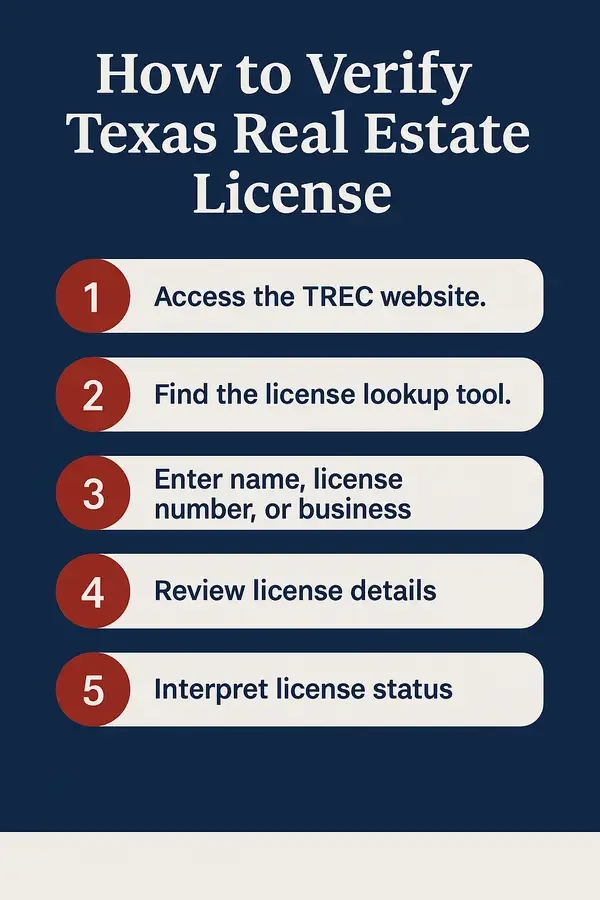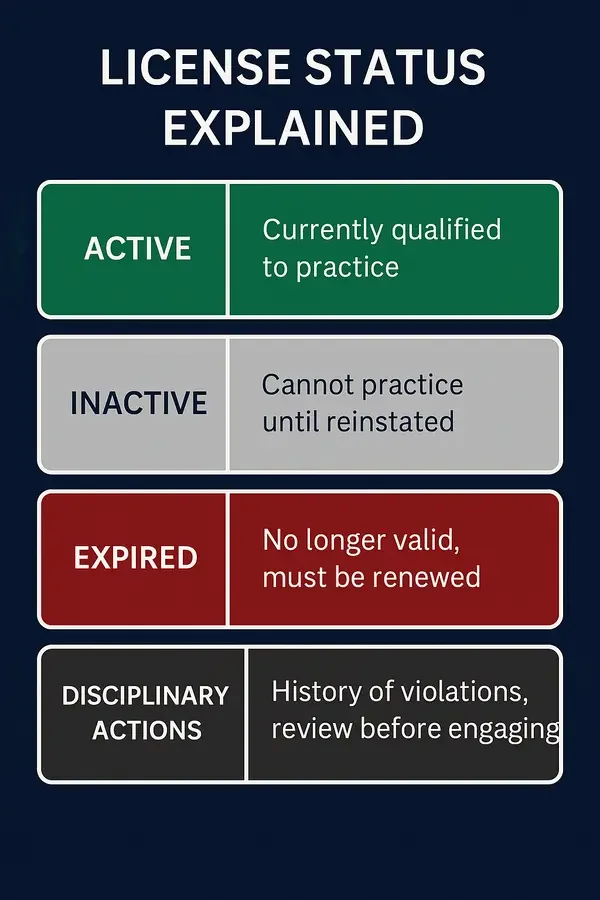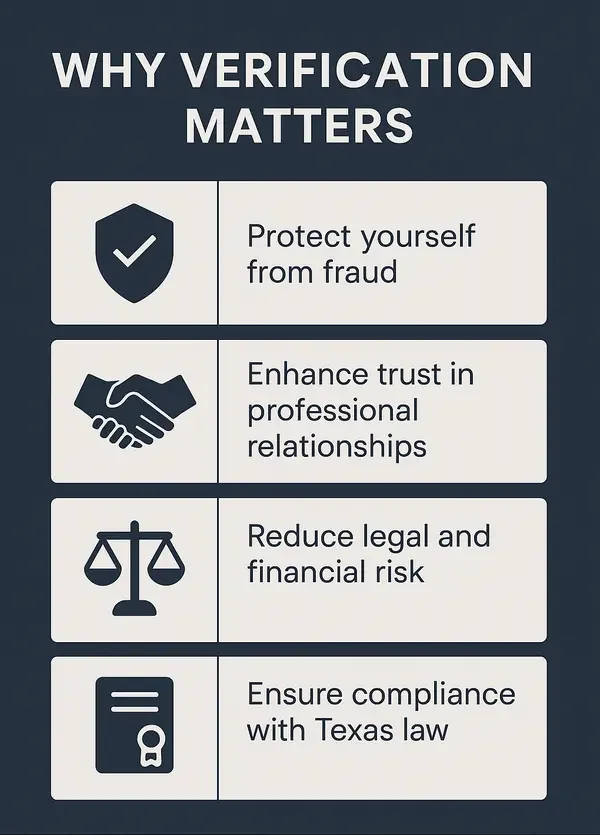A Guide: Easy Steps to Verify Texas Real Estate License
When you verify Texas real estate license credentials, you take one of the smartest steps to protect yourself before working with an agent or broker. Whether you’re buying a home, renting out a property, or managing investments, confirming that the professional you’re dealing with is licensed builds trust and lowers your risk. The Texas Real Estate Commission makes this process simple with its online database, giving you quick access to an agent’s status. By verifying a license, you avoid unqualified representation, guard against fraud, and make more confident decisions in every real estate transaction.
Why Texas Real Estate License Verification Matters
Verifying a real estate license safeguards your transactions against potential pitfalls. Ensuring a professional's credentials is crucial to successful property management and investment. When you are verifying real estate license information through the Texas Real Estate Commission (TREC), you’re guaranteed that an individual is authorized to operate legally.
Accessing TREC's license verification tool is straightforward. This tool helps confirm various details about the licensee's professional status. You can check whether a license is active, expired, or subject to disciplinary actions.
Why invest the effort? Protect yourself from unlicensed practitioners who may pose risks to your investments. Informed decisions lead to more favorable outcomes in real estate dealings.
Consider the benefits of verification:
Enhances trust and reliability in professional relationships
Reduces risk of legal and financial issues
Provides clarity on licensing status and history
Ultimately, license verification is a vital tool. It's a proactive measure that ensures ethical business practices and consumer protection in Texas's dynamic real estate market.
Overview of the Texas Real Estate Commission (TREC)
The Texas Real Estate Commission (TREC) is the governing body for real estate licensing in Texas. Established to oversee the industry, TREC ensures that real estate practices adhere to legal standards.
TREC provides a range of services crucial to maintaining professional standards. It licenses real estate agents and brokers and enforces regulations to protect consumers. By doing so, TREC plays a pivotal role in maintaining the integrity of the real estate market.
One key function of TREC is offering a comprehensive online license verification tool. This tool enables quick access to real estate professionals' credentials.
Here are some of TREC’s essential roles:
Issuing real estate licenses
Regulating industry practices
Enforcing legal compliance
Providing consumer protection
Through these functions, TREC fosters trust and professionalism in the real estate industry. Its commitment to transparency and education supports both consumers and professionals alike.
Step-by-Step Guide: How to Verify a Texas Real Estate License
This guide will walk you through each step to verify a Texas Real Estate License. The process begins with accessing the TREC website. Once there, you’ll find tools that offer detailed insights into a professional's license status. With these steps, you can efficiently verify Texas real estate license records before entering any agreement.
Choosing the appropriate search criteria—like a name or license number is essential. The right information yields precise results. This step requires accuracy and attention to detail. Once you've input the necessary data, you can review the returned license details.
Understanding a license's status, such as whether it's active or inactive, is vital. This status can affect your decision to engage with a real estate professional. TREC also lists any disciplinary actions, which are crucial for assessing a professional's history.
With these steps, you can efficiently verify a real estate license. Doing so will help protect your investments and ensure compliance.
Here are the steps summarized for quick reference:
Access TREC's website.
Find the license lookup tool.
Enter your search criteria.
Review the license details.
Interpret the license status.
By following this guide, you can enhance trust and transparency in your real estate transactions. This proactive approach is beneficial for investors, property owners, and anyone working within the real estate sector.
Step 1: Access the TREC Website
Begin by opening your web browser and typing in the URL for TREC. The website is the central place for real estate license information. Once on the homepage, you'll see various options for accessing services. Navigate to the license verification section.
Here’s a simplified path to follow:
Open your web browser.
Visit the TREC website.
Locate the licensing section.
The site layout is intuitive, making it easy even for first-time users to find what they need. Once you reach the site, you’re ready for the next step.
Step 2: Navigate to the License Lookup Tool
Once on the TREC homepage, look for the license verification link. This is the fastest way for validating a real estate license credentials online. The lookup tool provides an instant snapshot of whether a license is active, inactive, expired, or flagged for disciplinary actions.
Here’s how to navigate:
Find the ‘License Lookup’ section or equivalent.
Click the link to proceed.
Follow prompts to access the tool.
TREC ensures that this process is user-friendly. Thus, even those unfamiliar with online searches will find it manageable. After accessing the lookup tool, you're set to input search criteria.
Step 3: Enter Search Criteria (Name, License Number, or Business)
Accuracy is essential when using the search function. Many users find it easiest to verify Texas real estate license numbers directly because they’re unique and precise, unlike names which can sometimes be duplicated.
Each method has its advantages:
Name: Useful if the licensee’s full name is known.
License Number: The most precise and recommended if available.
Business Entity: Effective for confirming a business’s entire license portfolio.
After selecting your search criteria, double-check the inputted information. Typos can lead to incorrect results. Once satisfied, submit your search to retrieve pertinent details. License search results should match closely to your criteria. Pay attention to listed names and numbers to ensure accuracy. If needed, adjust search terms and try again.
Step 4: Review License Details and Status
After your search, review the results carefully. They will provide comprehensive details about the license. Key information includes the status and other essential data.
Focus on these aspects:
License Status: Active, inactive, or expired licenses will appear.
Expiration Dates: Ensure the license is current and valid.
Disciplinary Actions: Crucial for understanding any past issues.
Assess the license details in context with your needs. An active status typically indicates that the professional is in good standing. Meanwhile, disciplinary actions, if any, should be scrutinized. Taking the time to understand these aspects will greatly assist in making informed decisions. With this information, you’re better prepared to interpret the status.
Step 5: Interpret License Status (Active, Inactive, Expired, Disciplinary Actions)
Understanding what a license status means is vital for decision-making. Here’s a brief guide on interpreting different statuses:
Active: The licensee is currently qualified to practice.
Inactive: The licensee cannot practice until reinstated.
Expired: The license has lapsed and must be renewed for legal practice.
Disciplinary Actions: Indicates past violations or issues.
A license in good standing typically has an active status. This signifies compliance with TREC regulations. Check for expiration to ensure the license remains valid.
In contrast, an inactive or expired status requires further investigation. This might necessitate further verification before proceeding with any transactions. Take note of any disciplinary actions as a potential red flag. Through this process, you enhance due diligence for your real estate dealings. Accurate interpretation of license status protects investments and fosters transparency.
How License Verification Helps Owners and Tenants
For landlords and tenants, taking the time to verify Texas Real Estate License details gives peace of mind. Landlords avoid legal trouble by hiring licensed professionals, and tenants know they’re dealing with someone accountable to state regulations. Investors and property managers who consistently verify Texas real estate license status gain an edge. They avoid costly mistakes, maintain compliance, and work only with qualified professionals. This routine verification builds long-term credibility.
Regular use of the Texas Real Estate License verification tool gives both sides peace of mind. It also improves the professional reputation of your property or portfolio.
Additional Tips for License Verification
To streamline license verification, maintain a list of verified agents and their current status. Regularly update this list, especially before entering any new agreements. Familiarize yourself with TREC’s online resources. They provide additional insights and updates about changes in licensing laws or procedures. Keeping abreast of this information can be pivotal for timely compliance. Consider setting periodic reminders to re-check licenses. This proactive approach ensures that any changes in status, such as expiration or disciplinary actions, are caught early.
Here are some additional tips to enhance your process:
Maintain organized records of all checks.
Use calendar notifications to schedule regular verifications.
Leverage TREC’s support for any questions or clarifications.
Utilizing these strategies will significantly enhance your efficiency in verifying real estate licenses. Implementing this practice protects your investments and maintains professional integrity in your real estate dealings.
Common Issues and Troubleshooting
Sometimes search results don’t match what you expect. Always double-check spelling and numbers. If in doubt, re-run the search to verify Texas real estate license results again to confirm accuracy. This extra step ensures you’re not missing key information.
Occasionally, the TREC website may experience downtime or connectivity issues. In such cases, try again later or contact TREC support for assistance. Being patient and retrying later often resolves this issue.
If you encounter outdated license information, confirm the data’s last update. Comparing with the latest public data can clarify discrepancies.
Here are steps to address these problems:
Verify data entry for errors.
Check TREC's site for updates.
Contact TREC for unresolved concerns.
These steps will help you navigate verification challenges with ease and precision. License verification can seem complicated, so common questions often arise.
A helpful list for common concerns includes:
Frequency of checks
Handling discrepancies
Recognizing unlicensed activities
These answers should assist you in navigating the verification landscape smoothly and effectively.
How License Verification Supports Property Management and Investment
License verification plays a vital role in property management. It protects investments and ensures all dealings are with certified professionals.
Using TREC's verification tool can enhance trust and transparency in real estate transactions. It is crucial to confirm that all agents or brokers are authorized to operate.
Property managers benefit by avoiding potential legal issues from collaborating with unlicensed agents. This verification bolsters confidence in your professional alliances.
Investors also gain from license checks. They can make informed decisions when selecting agents to manage or sell properties.
Incorporating regular license verification into your strategy ensures:
Enhanced credibility
Reduced risk of fraud
Compliance with legal standards
Better decision-making
This due diligence fortifies your real estate portfolio, fostering a trustworthy environment. A proactive approach to license verification secures both property management and investment interests.
Resources for Ongoing Compliance and Education
Staying informed in real estate is crucial for success. Texas offers various resources to help maintain compliance and advance knowledge. Regularly accessing these can enhance your management skills.
The Texas Real Estate Commission (TREC) provides a wealth of information. This includes updates on regulatory changes and continuing education courses. Engaging in these resources ensures you're always in the loop.
Key resources include:
TREC's official website for latest legal updates
Continuing education programs
Industry workshops and seminars
Accessing these resources regularly keeps you compliant and informed. Being proactive in education helps you meet industry standards and achieve your property management and investment goals.
Conclusion: Protecting Your Interests with License Verification
Verifying a Texas Real Estate License is essential for safeguarding your investments. Commit to routine checks and always verify Texas real estate license information before partnering with a new agent or broker. It strengthens trust, improves decision-making, and protects your financial interests.
Commit to regular license verification to prevent potential issues. It bolsters trust and transparency in all your real estate interactions, ultimately protecting your interests efficiently.
Frequently Asked Questions About Texas Real Estate License Verification
-
Regular checks are advisable, especially before significant transactions or partnerships. A quarterly review ensures compliance and up-to-date information.
-
If discrepancies appear, double-check all entered search parameters. Contact TREC for further clarification if inconsistencies persist.
-
Yes, it identifies individuals lacking proper credentials. This step helps prevent engagements with unlicensed professionals.
-
Yes, disciplinary records are accessible and essential for understanding an agent's professional history.
-
TREC updates regularly, but verification of the "last updated" label provides extra assurance.




